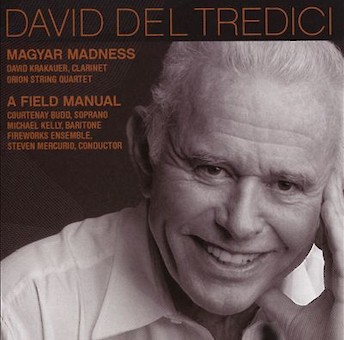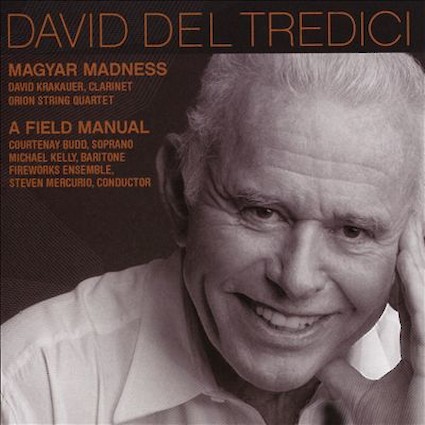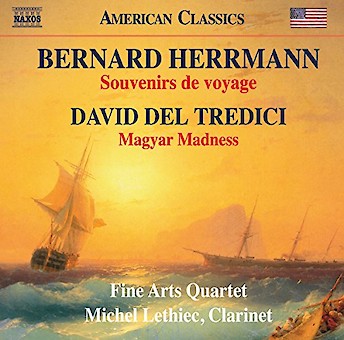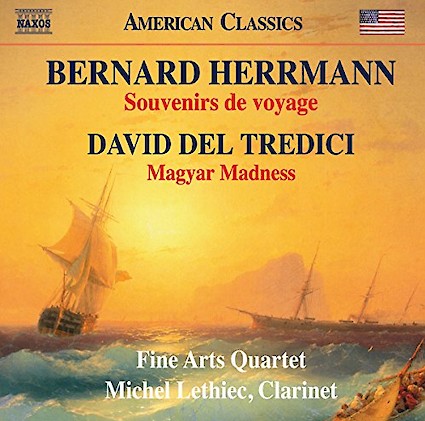Magyar Madness (live) on Naxos
10/27/2016
for clarinet and string quartet
Magyar Madness is a 35-minute Clarinet Quintet in three movements of wildly varying lengths. The first, "Passionate Knights," is 11 minutes; the second, "Contentment (Interlude)," a chaste 4; and the finale, "Magyar Madness," a whopping 20 minutes long. The work, commissioned by Music Accord for David Krakauer and the Orion String Quartet, is also dedicated to these remarkable artists.
The idea of creating a finale that hugely overshadows prior movements was inspired by an incident early in my composing career: The Juilliard String Quartet were performing the Beethoven opus 130 Quartet — but with a twist. The usual finale was replaced by the nearly 20-minute-long Grosse Fugue, opus 133, which (it turns out) was the finale Beethoven had originally intended for the piece. (Because the Grosse Fugue was so bewildering, Beethoven's friends after the premiere persuaded him to write a shorter, more conservative, finale — which, surprisingly, Beethoven did. And so the quartet has since been played.) When I heard the Juilliard's reconstitution of the quartet, I was electrified. The enormous finale changed everything. Earlier movements that had seemed substantial were now dwarfed. All the weight of the piece had shifted to the end, making it seem that the best had been saved for last. As an example of musical design, this experience stayed with me. (In fact, I used the same device in my String Quartet No. 1.)
I. "Passionate Knights"
The first movement begins with a fiery clarinet cadenza punctuated by strings and leads to an impassioned main theme. Moving through a series of contrasting motives — some perky, some dramatic — the movement divides into two halves, the second of which is a varied reprise of the first (like a sonata form without a development). The lengthy, dramatic coda then acts as a kind of development and leads to a second, more reposeful clarinet cadenza and a calm ending. This was (one could say) a knight well spent.
II. "Contentment (Interlude)"
The short, quiet movement that follows is for muted strings alone. It is, in essence, a transcription of a song I wrote in 1998 for piano and baritone. The music — sweetly ardent, lyrical and contented — belies (perhaps) the text I set: a poem by Edward Field entitled "Street Instructions: At the Crotch."
III. "Magyar Madness"
The 20-minute finale is subtitled "Grand Rondo a la Hongroise." The movement's title alludes to David Krakauer's performance group, "Klezmer Madness"
David, a specialist in klezmer (Jewish folk music of Eastern Europe), asked me to write something using that melismatic style. I told him, "Oy vey! Klezmer I can't do, but Hungarian I'll try." What I had in the back of my mind was Schubert's four-hand masterpiece, Divertissement a la Hongroise, opus 54. In this piece, not only does Schubert give the harmony an oddly ethnic seasoning, but in the last movement — a rondo he introduces a quasi-Gypsy device that intrigued me: Each repetition of the theme is increasingly ornamented, and the accompaniment grows more and more animated. The illusion is that the tempo is accelerating — a wonderful way to enliven what is, after all, mere repetition. The idea of literally speeding up each appearance of a theme over the course of an entire movement — of creating a goulash of musical frenzy — gripped me.
The finale begins with the clarinet's return in a virtuosic cadenza. The music then settles into a "Hungarian" rondo-theme in G-minor, made up of even quarter-notes over a steadily oscillating accompaniment. This rondo-theme at its next repetition is systematically shortened. What were uniform quarter-notes are now, in alternations, quarter-note / eighth-note, quarter-note / eighth-note, etc. The effect is increased agitation. A third statement is faster still — twice the opening speed. Quarter-notes are now replaced by eighth-notes. Even more frenetically, the theme is further reduced to eighth-note / sixteenth-note, eighth- note / sixteenth-note, etc. And finally, fastest of all, at four times the speed of the opening, there is a frantic version of the theme in running sixteenth-notes.
Amid the ever-accelerating rondo sections are three contrasting episodes. The first — boisterous and energetic — is capped by a dramatic reprise of the movement's opening clarinet cadenza. The second episode, in complete contrast, is (as the score says) "music from afar" - mysterious and pianissimo throughout. To that end, I ask the strings to use especially soft "practice" mutes and the clarinetist to play from off-stage. The third episode, which follows the second immediately, is wild and barbaric with (like dashes of paprika?) hugely virtuosic clarinet flourishes — bringing out, to borrow from Cole Porter, "the Gypsy in me"!
As a coda and calming antidote, the rondo-theme reappears quietly — now, for the first time, in G-major — while the clarinet trails behind in canon. Eventually, though, the music rouses itself to close in a "proper" Hungarian frenzy.
HERRMANN Souvenirs de voyage. DEL TREDICI Magyar Madness • Michel Lethiec (cl); Fine Arts Qt • NAXOS 8.559796 (69:02)
The first thing to praise about this new release is the coupling: a major clarinet quintet (lasting some 44 minutes) by David Del Tredici, one of America's most important contemporary composers, together with an attractive concert work in the same medium by the great film composer Bernard Herrmann. The latter piece has had two earlier recordings that I am aware of, but this is the world premiere recording of Del Tredici's Magyar Madness. It was composed in 2006 and is in three movements, although the balance of those movements is by no means traditional. The first, Passionate Knights, begins dissonantly but soon settles into the post-Romantic tonality we know from Del Tredici's later works inspired by Lewis Carroll's Alice. (Unlike so much of the composer's output, this quintet has no literary influences.) The movement contains considerable vitality and variety, including a nervous central scherzando section and two solo cadenzas for the clarinet. The second movement, for strings only, is a transcription of a song written in 1968. It is described by the composer as "sweetly ardent, lyrical and contented". Indeed, the movement is titled "Contentment".
The third movement, "Magyar Madness", gives the whole work its title. Clarinetist David Krakauer, who commissioned the piece, played in a kletzmer ensemble and asked Del Tredici to include music in the kletzmer style. He responded instead with a Hungarian influence in the form of this Magyar fantasy titled "Grand Rondo à la Hongrois"––and grand it is, lasting over 25 minutes and taking up more than half the quintet's entire duration. After the relative earnestness of the earlier movements, the rondo bursts with festive exuberance. Lethiec and the members of the quartet throw themselves into it with gusto, capturing all the vitality, shifting colors, and delight in pastiche that Del Tredici expresses in the writing. His quintet is nothing less that a tour de force, and it is ridiculous that we have had to wait ten years for a recording. Never mind: we have one now, and it is terrific.
Souvenirs de voyage (1967) is one of two chamber works Bernard Herrmann produced towards the end of his life. (The other is the String Quartet, "Echoes", which has also been recorded by this group on a Naxos disc, coupled with String Quartets by Philip Glass, George Antheil and Ralph Evans, the ensemble's first violinist.) Herrmann's quintet is one of the most successful attempts I know by a 20th Century composer to write uncompromisingly tonal and deliberately beautiful music without sounding dated or derivative. The opening theme of the Berceuse movement––played in thirds by the violins––once heard is never forgotten, while its quicksilver central section evokes memories of the composer's early scores for Orson Welles. An autumnal quality that pervades the whole work reminds us of Herrmann's love of the English pastoral school, although a Mediterranean warmth lingers here too: the second and third movements employ siciliano and tarantella rhythms respectively.
The FAQ (that's Fine Arts Quartet, not Frequently Asked Questions) consists of violinists Ralph Evans and Efim Boico, violist Juan-Miguel Hernandez, and the distinguished cellist Robert Cohen, who has been playing in the quartet since 2012. In these performances, recorded live in France in 2013 and 2015, they respond to every mood and rise to all demands, which in the case of the clarinet part in the Del Tredici piece are often hair-raising. The recording gives the instruments a close balance, sometimes resulting in a piercing high note from the clarinet, but the sound is always warm and clear. The main competition in the Herrmann comes from a Delos recording made at the Chamber Music Northwest festival in 1990. Featuring David Shifrin on clarinet, it also includes some well-known names in the string department: violinist Pamela Frank and violist Walter Trampler. Their performance is poised and subtle (especially the romantic theme of the second movement), and the acoustic is dryer. The choice comes down to couplings: the Delos has Ives's Largo for Violin, Clarinet, plus rare Clarinet Quintets by Quincy Porter and David Diamond. While I am definitely hanging on to the Delos disc, I would not be without Magyar Madness.

10/27/2016



World premiere recordings

